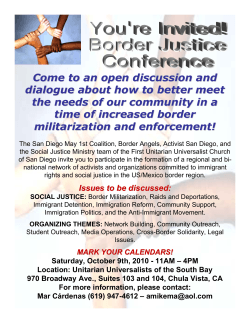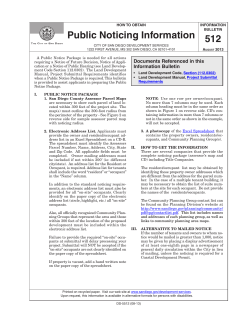
C J
(213) 250-9797 • http://www.asianjournal.com IMMIGRANT LIVING: 101 AND BEYOND Community Journal EVERYONEdoes.Butwerelegate the story to children’s lit and condescendinglyforgetthatthese cutelittleporkersbringhomean importantpointaboutthechoices we make when we embark on building something worthwhile – like choosing the foundation onwhichwebuildourimmigrant life. Thefirstpigbuilthishouseof straw and the second one built hishouseofsticksandwentpartying till the cows came home. And the big bad wolf, who had a hankering for chicharrones, came down huffing and puffing andblowingbothhousesdownin asnap,muchtotheutterdismay ofthetwohapless,lazyporkers. Runningfortheirliveswiththeir curled,tinytailsandthehairon theirchinny,chinchina-quiver- ing, they dashed over to safety, straighttothehouseoftheirother stolid,somewhatstodgybrother pigwhohadbuilthishousemethodically, meticulously, slowly, brickbysolidbrick.Enterthebig bad wolf, now crazed with the thoughtofwolfingdownnotone butthreepigs.Hedoeshisblusteryhuffingandpuffing…well… youknowhowthestoryended. Any structural engineer will agree with the third porker and Searching for a kababata from your hometown, a college buddy or a Pinoy colleague? Your search is finally over. The Asian Journal brings you Re:Union, Filipino American Associations in America -- your link to a network of kababayan associations here in the United States. As your Filipino-American community newspaper, the Asian Journal recognizes your need to nourish and maintain ties with the people and the culture you were born with. This is our way of connecting our kababayans to the past, of creating new opportunities for the present and of inspiring you to pay it forward by becoming active members of your association and the FilAm community at large in the future. Council of Philippine American Organizations of San Diego County, Inc. (COPAO) Contact: P.O. Box 1504, National City, California 91951-1504 Telephone: 619-477-4090 www.copao-sandiego.org Mission statement COPAO San Diego is a collaborative of organizations united by a common concern for the economic, social and political empowerment of its members through developmental programsandprojects. COPAO is a California PublicBenefitCorporationandIRS501(c)(3) organization. A brief history of COPAO ByAuroraS.Cudal It is not surprising thatthealmost200,000 Filipino-Americans in San Diego County, who originate from the different regions and provinces of the Philippines, and who come from allwalksoflife,haveformedavarietyofsocial clubs, school organizations, professional societies,andsoforth.Infact,byunofficialcount, there are close to 200 different organizations thathavebeenformedbyFilipino-Americansin SanDiegoCounty. Perhapsbecauseofthisdiversity,theCouncilofPhilippineAmericanOrganizationsofSan DiegoCounty(COPAO)wasformedtobeginto bringthemanygroupstogetherunderasingle “umbrella” organization. Over the years, it’s governingbodyhasmetamorphosedintoaunicameral Executive Council, serving as the legislative and administrative body over approximately50differentmemberorganizations. COPAOwasstartedbyretiredFilipinosfrom the US Navy, doctors, nurses, social workers and educators who came together in 1971, to organizeanumbrellaorganizationinorder“to fosterharmonyandmutualcooperationamong Filipino-American organizations and the communityatlarge.”Otherobjectivesoftheorganizers were to work together to (1) promote understanding of Filipino cultural heritage (2) protectthelegitimateinterestsofFilipinosand Filipino-Americans(3)expandopportunitiesfor education, health, business, employment and social services (4) advocate civil rights, equal opportunityandsocialjustice,andto(5)build character, integrity, self esteem and a positive imageofFilipinosandFilipino-Americans. Inthefinalchapterof“BeyondtheMask”,a book about the life and times of US Navy Filipinos, Dr. Riz Oades, writes about COPAO’s challengesandaccomplishmentsundervarious administrationsendingwiththatofJayV.Ruiz, who was responsible for initiating many communityprojects,foremostofwhichisthePhilippine Faire and Parade, which has become an annualeventtocelebratetheanniversaryofthe declaration of Philippine Independence from Spain. ThelateErnieFlores,Jr.,publisherandeditor-in-chief of The Filipino Press and former historian of COPAO, wrote that in 1967, The FilipinoCommunityOrganizationofSanDiego County(nowknownasthePhilippineAmerican Community of San Diego County), received a few thousand dollars from the City and County to fund anti-poverty programs for Filipinos. The president of the organization at that time was Filemon Adrid, a realtor and retired Navy serviceman. This was the first known government-funded project ever directed to the then growing Filipino-American community in San DiegoCounty. In 1972, Filemon Adrid, with the help of a fewcommunityleadersdecidedtoformaseparateentitytoaddressthesocialserviceneeds oftheFilipinos.Withtheparticipationofadozen or so Filipino associations, the new entity was called the “Council of Pilipino-American Organizations(COPAO).Adridbecameitsfirst Chairman. Thatyearagroupofdoctors,nursesandother communityleadersorganizedOperationSamahan,Inc.withCOPAOasitsfiscalagentthrough the late 1980’s until funding was stopped. For abrieftime,COPAOalsohadanAsiancomponentprogramdirectedspecificallytotheneeds of Chinese, Indo-Chinese, Japanese, Koreans andPacificIslandergroupssuchasHawaiians, Samoans, Tongans, etc. This component later separated from COPAO to form what is now knownastheUnionofPanAsianCommunities (UPAC). Through the 70’s and 80’s COPAO operated withfundingcomingfromthecity,county,and 100505 - MW SEC B.indd 3 B 15 tips: How to build a house of bricks “Adapt, you must. Or die early, you will.” What the dodo bird’s mantra should have been Remember the story of the three little pigs? Monette AdevA MAglAyA LA MIDWEEK ASIAN JOURNAL • MAY 5-7, 2010 allude to the biblical reference about a house built on a rock andthewindandraincouldnot prevailuponit.He will tellyou thatsolidfoundationworktaking stress points into account is basicinbuildinganythingofvalue that’s meant to last. The same istrueinbuildinganimmigrant life. I am certain there are countless other pointers hundreds of thousands of immigrants more than 200 years ago can add to the growing pool of knowledge and wisdom in this continuing sagaofimmigrantsshapingthis great country called America, but in the interest of brevity, I haveculledoutonly15bite-size pointers gleaned and gathered by observation and study. The lastsetof5tipsareinthisfinal installment. I am guessing you haveyourownlistthatyoumay wanttosharewithothers. (ContinuedfromPart2ofa3partseries) 11.Praywithoutceasingtothe God of your being. Realize that when you do, you will never be alone. The single, most importantfoundationofatransplanted life begins with the realization that by yourself alone, without help,youcandonothingofreal meaning and lasting value. No obstacleistoosteep,nosituation toodifficult,orsetbacktoooverwhelmingthatcannotbehelped byconstant,heartfeltprayerand afoundationoffaithsostrong,it canmovemountains. 12.Bringitalltogether.Once yourcircumstancesbecomestable and you are able to choose the type of work you love to do andmoreimportantly,thatwhich makesyouhappy–goforit.The shift will be uncomfortable and unnervingatfirst.Seekthepath thatmakesuseoftheabilitiesand the talents that you were born with. Listen to what your whole being says you were meant to do and enter that rare, enviable state of being that finally feels likecominghome. 13. Rein in the spirit of the crab.Putanumberoflivecrabs inabasketandwitnesshowcrabs behave. Any crab successful enough to rise above the heads oftheothercrabstoescapethe confines of the basket will be pulleddownbythepincerclaws oftheothercrabsunderfoot.The crab mentality is nothing more thanenvyindisguise–aliveand well in human nature. Lest you thinktheSevereAcuteCrabSyndrome(SACS)–anameIcoined for this social phenomenon – is endemic or unique only to our community,takeheart,forwe’re notalone.Otherimmigrantcommunities report the same thing. To counteract this, try and be happy for others (even if it kills you). 14. Strive to learn any way you can. Learning is a lifelong process of adaptation. And to copy Yoda’s transposed way of making a point, “Adapt, you must. Or die early, you will.” The dodo bird never learned to adapt, never learned to defend itself against predators and becameextinct.It’sbeensaidthat the human mind is like a cup with a hole at the bottom. You justhavetokeeptryingtofillthat bottomlesscup.Butbewarned: intelligence alone is sorely inadequate. The whole person’s mindandheartmustevolve.Of the two, the heart should lead. Draw from the strength of our own culture and weave it into thenewone.Thehybridisoften bettersuitedtothenewenvironment. The American Jews have been remarkable because they knewthevalueofeducationand hitthelibrariesearlyinthehistoryofthiscountryandwentall thewaytothehighestlevelsof learning. Many now dominate multiple areas of achievement. Takeacursorylookattheyoung ones who frequent your local libraries and those who do volunteerworkandyoucantakea peek at what the future holds. See a preview of which immigrant communities today will replicate the patterns of excellence and achievement seen in earlier groups of immigrants. Yet,wemustneverlosesightof thefactthatintheend,alllearning means nothing if we never learnhowtolove. 15. See the big picture. Betweenbirthanddeathislife.How youliveyourimmigrantlifeisup to you. Many of the wisest men who have pondered the meaning and the purpose of life over thousandsofyears,havedefined life according to their own perceptions and circumstances. In theend,ifyouareinfullcontrol ofallyourfacultiesasanaverage humanbeing,youandyoualone defineyourownlifewiththeset of gifts and the circumstances thatlifegivesyou. Immigrant or native, rememberwhatsomeoneelsewroteso succinctlylongagoabouttheessenceofanyworthwhilelifeand thatis–TOLIVEWELL,LAUGH OFTENANDLOVEMUCH. May the house of bricks you buildallowyoutodoallthat. *** Nota Bene: Monette Adeva Maglaya is SVP of Asian Journal Publications, Inc. Read her book, “The Complete Success Guide for the Immigrant Life: How to Survive, How to Thrive, How to be Fully Alive.” She also edited its companion book of quotations. Your local public library might have these books available or you can request your librarian to purchase copies. These are also available at amazon. com or immigrantsuccess.com Past articles are on the internet at www.asianjournal.com To ask questions, send feedback and requests, e-mail monettemaglaya@sbcglobal.net or monette@asianjournal.com Apportionment of retirement benefits… PAGE B2 t the United Way. At one time funds were also coursed through the Metropolitan Area AdvisoryCommittee(MAACProject),abasicallyLatino-orientedprogramintheSouthBayarea. Throughtheyears,COPAOhadbeenheaded byasuccessionofChairpersons(seelistbelow). In 1992, COPAO’s ByLaws were amended and a House of Delegates was organized to serve asthelegislativearmofCOPAO.TheSpeakers of the House of Delegates were Roy Bautista (1993-1994), Zenaida Mascardo Ravelo (19951996),OscarSa.Garcia(1997-1998)andGreg Alabado(1999-2000). In 2000, the COPAO ByLaws were again amended,leadingtoseveralsignificantchanges inthestructureofCOPAO.Overtheyears,it’s governingbodyhasmetamorphosedintoaunicameral Executive Council, serving as the legislative and administrative body over about 50 differentmemberorganizations. So,in2000,theHouseofDelegateswasabolished,aBoardofTrusteeswascreated,andthe title of Chairman was changed to “President”. The first member to hold the title of COPAO President was Oscar Sa. Garcia. Click here or on“Members”intheNavigationBarontheleft margin to view the list of Member Organizations. In 1997, Aurora Cudal, then Chairperson of COPAO, approached Joel San Juan, Executive DirectoroftheOperationSamahanHealthClinic and appealed to him to provide temporary officespaceforCOPAO.Thesupportextended by Operation Samahan Health Clinic and the successful fundraisers and popularity contests held in connection with the Philippine Faire during the Philippine Centennial Celebration, ledtotheaccumulationoffunds.Thisencouraged the Cudal, Oscar Sa. Garcia (Speaker of theHouseofDelegates)andMarcDeGuzman (ChairoftheFinanceCommitteeandtheBuilding Committee), to pursue the purchase of a real estate property to house a permanent office for COPAO. A four bedroom house with a separatetwodoorgaragelocatedat832EAvenue,NationalCity,California,wasselected.The owners,AmadoandJulieQuintanilla,agreedto sellthebuildingtoCOPAOfor$145,000,minus $10,000,whichtheygenerouslydonatedtothe organization. In October 1998, to augment its own funds, COPAOappliedforamortgageloanfromWells Fargo Bank. This was facilitated by an unexpected no-interest loan of $25,000 from Mrs. Remy Broas, which completed the required downpayment.Thedealtopurchasethebuilding from the Quintanillas was completed on April 9, 1999. The Building Committee, then chairedbyOscarSa.Garcia,mobilizedfriends and volunteers to transform the garage into a usableofficeandmeetingplace,nowcalledthe COPAOCenter. In April 2004, COPAO officers presented a checkfor$67,000toWellFargoBank,thereby livinguptoitscommitmenttopayforthebuildinginfullby2004.Withthatfinalpayment,COPAObecamedebtfree!Thebuildingitselfhas alreadytripledinvalue! Since its inception in 1972, the Council of Philippine American Organizations of San Diego County, Inc. has accomplished much. Its informationprogramsandavarietyofservices have provided countless men and women referral and counseling on matters pertaining to theirhealthproblems,accesstosocialservices, immigrationandnaturalization,trainingandjob placementandlegalproblems.Ithasalsobeen an advocate on issues affecting ethnic minoritiesandhasjoinedhandswithotheragenciesin itsdriveforpoliticalempowerment.COPAOhas collaboratedwithvariousagenciessuchasthe aremoreappropriateforthecircumstancesanduniquenatureof theretirementplan. Whereanemployeespouseis single throughout employment and marries only after retirement,pensionorotherdeferred compensation is separate propertyeventhoughreceivedduring the marriage. An exception to apportionmentofanon-employee spouse’s right to share in a community pension interest are certain preexisting obligations. A non-employee spouse’s right toshareinacommunitypension interest may be subordinate to otherliabilitiesassertableagainst that interest such as where the benefits are already committed toathirdpartyunderapreexisting legal obligation. Situations like this arise in instances such asobligationsarisingoutofprior divorcecasesoraspouse’spior tax deficiency liability enforceableagainsttheretirementben- efitthroughtaxlevy. *** Attorney Kenneth Ursua Reyes was President of the Philippine American Bar Association. He is a member of both the Family law section and Immigration law section of the Los Angeles County Bar Association. He has extensive CPA experience prior to law practice. Law Offices of Kenneth Reyes, P.C. is located at 3699 Wilshire Blvd., Suite 700, Los Angeles, CA, 90010. Tel. (213) 388-1611 or e-mail kureyeslaw@aol.com. Website kenreyeslaw.com (Advertising Supplement) u PAGE B4 5/4/10 2:04:24 PM
© Copyright 2025





















